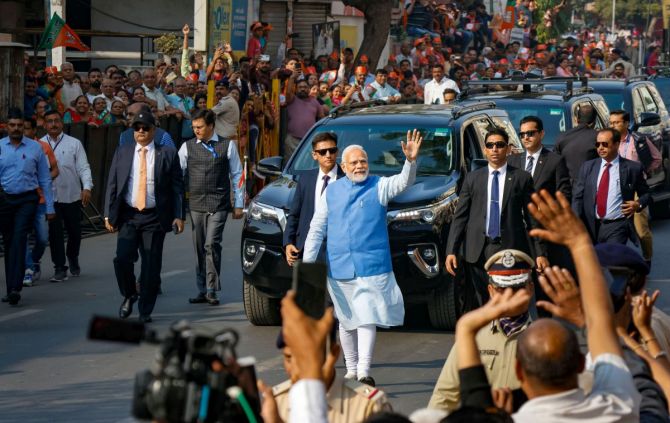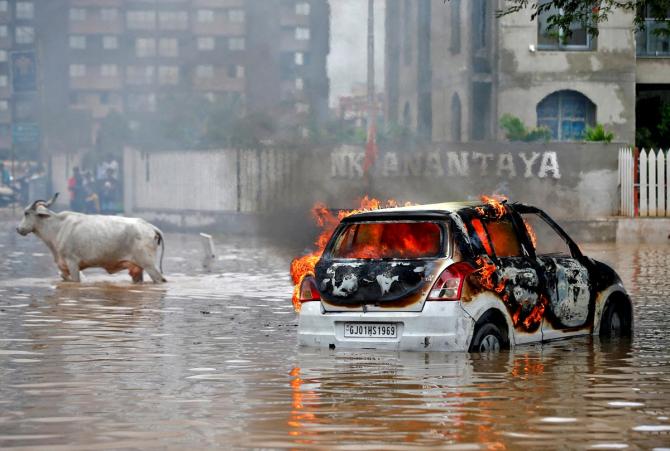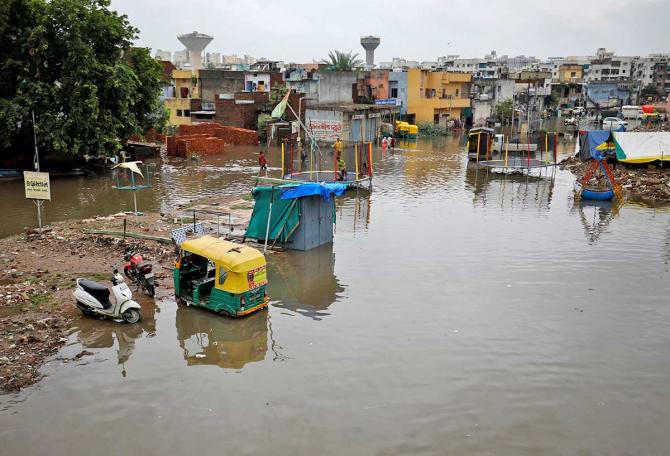Better living conditions must be an integral part of all political campaigns.
But this will only happen if the public pressures the political class to understand the irreversibility of climate change and make the environment a crucial part of their manifestos, notes Rashme Sehgal.

Gujarat's long coastline of over 1,663 km from Kutch in the north to Valsad in the south has seen significant changes in rainfall patterns over the years.
The entire state has been exposed to changes in the surface sea temperatures, an intensification in cyclonic activity and storm surges in the Arabian sea.
But politicians across affiliations did not touch on these vital issues during the election campaign even though they are key to the survival of citizens.
Look at what happened this year. Both the Saurashtra and Kutch regions received 951% excess rain by September 14, according to statistics of the Gujarat State Disaster Management Authority.
The rainfall caused widespread damage to crops.
Farmers in South Gujarat also saw their paddy and sugarcane crops destroyed, and the farmer's body, Gujarat Khedut Samaj, has estimated losses running into over Rs 500 crore (Rs 5 billion).
Farmers in the Surat district calculated their paddy crop losses at more than Rs 30,000 crore (Rs 300 billion).
Banana farmers in Gujarat's Narmada district also suffered significant losses this year, as heavy rainfall and floods took a toll on their harvests.
The farmers here export a large chunk of their produce and had expected considerable profits in 2022.
The authorities suddenly released 200,000 cusecs of water from the Karjan dam in the Narmada district without reportedly prior intimation to the villagers.
Heavy rainfall combined with this vast quantum of water caused massive flooding of banana plantations, and crop damages have been estimated at over Rs 100 crore (Rs 1 billion).

In 2019, Gujarat witnessed three back-to-back cyclones -- Vayu, Kyarr and Maha -- while its coastal regions saw 1,185 mm of rainfall.
Earlier, rainfall was restricted to between June and September, but it now occurs every month, destroying dry crops such as cumin and black gram.
All this is being recounted because, for farmers, losses have begun to mount on all fronts.
Bhargav Soneji, who lives in Sakva village in the Narmada district, says, "Rainfall patterns have become very erratic. Earlier, we received rain for just two months in a year. Now, coastal regions also receive unprecedented hailstorms."
Soneji blames the unprecedented urbanisation of Gujarat as worsening the problems of farmers.
"Scientists warn that increasing urbanisation affects rainfall patterns, but our urban bodies scarcely heed them. We farmers suffer while the real-estate developers make money at our expense," he says.
Soneji's wife Rajashree says, "Our politicians never think long-term. Instead of promoting organic vegetable and fruit, they push fertilisers which damage the soil. Sadly, people also want to more lavish lifestyle which is environmentally unsustainable."

Dr Shree Kumar, a climate activist, is shocked at how the public ignores environmental concerns instead of holding politicians to account on the concerns, such as rising soil infertility, receding groundwater tables and industrial pollution in Gujarat.
"The track record of the state government on all these issues is abysmal," Dr Kumar says.
The Central Pollution Control Board has identified the industrial districts of Ankleshwar and Vapi as the country's most critically polluted hotspots.
Industries in this and other cities are known to dump effluents in water bodies without treatment.
The record of Ahmedabad, Vadodara, Surat and Rajkot in terms of air quality and industrial pollution is also a concern.
"During elections, the focus is on unemployment, rising prices and healthcare, without the understanding that all three are linked to the availability of clean water and pure air. The adverse impact of pollution on health is a matter of growing concern," Dr Kumar adds.

One exception is the Adivasi agitation in Tapi district against the state government's decision to give 425 acres of land in Doswada village in the Nisar assembly constituency to the Vedanta subsidiary Hindustan Zinc Ltd.
Hindustan Zinc Ltd had proposed to set up a smelter plant at the cost of around Rs 10,000 crore (Rs 100 billion).
The Adivasis living here belong primarily to the Bhil community and depend on agriculture for their livelihood.
They were shocked to learn that the state government had agreed to hand over their land without consulting any of the gram sabhas.
Most of these gram sabhas had opposed the project because pollutants from the smelter plant would adversely affect the agriculture of the 92 villages around Doswada.
Dr Sanghamitra Gadekar, a known anti-nuclear activist who heads the Sampurna Kranti Vidyalaya located in Vedchhi village in the Tapi district, played a crucial role in mobilising the Bhil tribals of this area.
Says Dr Gadekar, "We even got Niyamgiri tribals from Odisha to visit Doswada and interact with the Adivasis and show them how to organise and sustain a long and successful protest as they had done against the setting up of the aluminium refinery by Vedanta in their region."
G"The villagers learnt from this interaction understanding first hand just what the harmful effects of such a smelter plant would be on their health on their crops," Dr Gandekar, who is the daughter of Gandhian Narayan Desai, adds.
A public hearing organised on July 5, 2021, saw more than 25,000 villagers gather to voice their protest against the smelter plant.
The villagers made it clear that the Bharatiya Janata Party needed to be taught a lesson and have avoided all interaction with local BJP leaders during the last year.

Health activists are also concerned about how political parties have completely ignored the intense heat waves afflicting all of Gujarat's cities.
This is a direct consequence of urbanisation, but while the well-off can afford ACs, this is not the case with millions who are living in slums around these cities and are having to face these searing heat conditions with nothing but makeshift tarpaulin sheets to insulate them from the heat that kicks in during March and continues up to October.

Dev Desai, a social activist with Anhad, says, "In June 2010, Ahmedabad witnessed over 1,000 deaths when the temperature touched 48 degrees. Now the government claims to have introduced several measures, including a cool roofs programme, but for the majority of workers living in slums, they continue to seek shelter under heat-trapping roofs and roads."
Better living conditions must be an integral part of all political campaigns.
But this will only happen if the public pressures the political class to understand the irreversibility of climate change and make the environment a crucial part of their manifestos.
Feature Presentation: Aslam Hunani/Rediff.com











 © 2025
© 2025